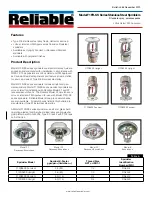
VALVE WON'T OPEN
(a)
Control (field) wires severed.
(Electric)
– Isolate and repair.
(b)
No power to controller.
– Establish controller power.
(c)
No power from controller to solenoid.
– Check for blown fuse and replace.
(d)
Manual control selector on pilot valve assembly turned to "OFF" position.
– Turn to "AUTO" position.
(e)
Pilot valve solenoid inoperative.
– Remove and replace.
(f)
Pilot valve plunger movement restricted.
– Inspect, clean and/or replace.
(g)
No supply from main valve.
– Debris in control tube, main valve assembly and/or communication passages in
body. Flush thoroughly.
VALVE WON'T OPEN
(a)
Plugged controller discharge line or discharge port in pilot valve.
(Hydraulic)
– Verify by checking for discharge at discharge line when station is
activated. If no discharge, refer to Controller Service Manual.
SPRINKLER WEEPING
(a)
Damaged or blocked valve seat.
(Slow leak in valve)
– Remove blockage and, if necessary, replace valve assembly.
(b)
Damaged piston seal or piston assembly.
– Replace valve assembly.
(c)
Low pressure on supply line .
– Check for low pressure reason and correct.
(d)
Elevation of normally closed sprinkler exceeds 75' (22.9 m) differential.
SEVERAL VALVES ON DIFFERENT
(a)
Control tubing leak which lowers supply pressure to other stations.
STATIONS FAIL TO CLOSE
– Turn controller from station to station until a station is reached where
(Hydraulic)
only valves on that station stay open. The leak would be in the tubing
on that station. Isolate and repair.
(b)
Leak in supply line to controller.
– Verify by checking pressure in all control lines.
(c)
Leak in controller pilot valve.
– Verify by constant discharge from controller.
(d)
Plugged supply line filter.
– Replace filter if more than 3 psi (0.21 bar) differential exists.
7




























